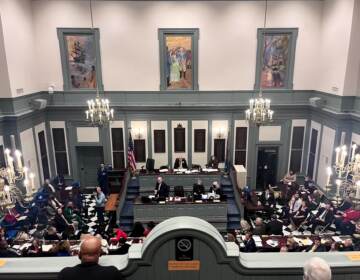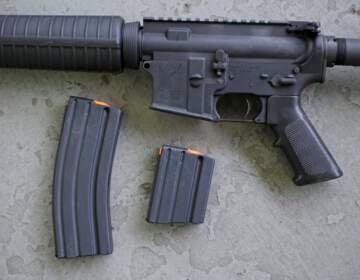Delaware Senate approves gun permit requirements and high-capacity magazine ban
Two measures regulating the sale and use of guns in Delaware were approved by the State Senate Thursday afternoon.

Delaware State House (Google Maps)
The Delaware Senate voted Thursday afternoon to require handgun buyers to get permits and training before making their purchases. The lawmakers also banned large magazine clips that have been frequently used in mass shootings.
Senate Bill 3 would require anyone who wants to buy a handgun to first undergo a training course and apply for a permit. Currently, only those who carry concealed weapons in Delaware are required to get training and a permit.
“It ensures that handgun owners will have undergone firearm training courses to reduce the number of accidental shootings, suicides, and gun deaths,” said the bill’s prime sponsor, Sen. Tizzy Lockman. “That will keep everyone that much safer.”
SB 3 passed in a 13-8 vote, with Sen. Bruce Ennis as the only Democrat to join seven Republicans in voting against the measure.
Lawmakers also approved Senate Bill 6, which makes magazines that hold more than 17 rounds illegal. Again, Ennis was the lone Democrat to vote no.
“Magazines capable of feeding 30, 40, 50, or 100 rounds of ammunition into weapons are a common thread among mass shooters in the United States,” said bill sponsor Sen. David Sokola. “The more bullets one can fire, the more death and injury one can cause.”
Both bills were part of a two-hour Senate Judiciary Committee hearing on Wednesday, which drew local and national groups to make their arguments for and against the measures.
Megan O’Donnell of Wilmington was attending a country music festival in Las Vegas when a gunman opened fire, killing 59 and injuring hundreds more in 2017. Now a volunteer leader with the group Moms Demand Action, O’Donnell said a ban on high-capacity magazines could have reduced the massive number of victims at that Nevada concert.
“How many people would still be here today?” she asked committee members. “Mass shooters aiming to inflict mass casualties are specifically seeking out these magazines because they increase the number of bullets they can fire without reloading.”
Opponents of the bill like David Mellon said the magazine size limits would benefit criminals who wouldn’t abide by the law anyway.
“By limiting our capacity to defend ourselves, we’re going to be outmatched by criminals. That is just unacceptable,” Mellon said.
There was similar debate over the bill requiring permits and training for handgun purchases. Some opponents said the extra cost to get trained and buy a permit would disproportionately affect residents who make less money.
Others said people who need to protect themselves would be at risk while waiting for their permits and training to be completed. Several opponents, including Phillip Shull, pointed to a 2015 case in New Jersey in which a woman who had applied for a gun license was stabbed to death in an apparent domestic dispute.
“There are many instances of women being murdered while waiting for these permits,” Shull said. “A right delayed is a right denied, and these bills will have implications that will hurt people.”
Democratic Sen. Kyle Evans Gay challenged those who argued against the bills in that manner, saying it used women as props. “I would ask how many women have to die by gunshot wounds in the name of ‘arming women to protect themselves,’” she said.
Daniel Webster, director of the Center for Gun Policy and Research at Johns Hopkins University, also refuted those claims, saying permit laws have been proven to be an effective tool to reduce gun violence.
“What we find very consistently in our research is that laws requiring permits to purchase reduce homicides, suicides, mass shootings, shootings involving law enforcement officers,” he said. “We’ve found it’s a great deterrent to diverting guns for criminal use through straw purchases.”
The debate veered off the rails as Republican Sen. Dave Lawson likened the measures to actions taken as the Nazi party rose to power.
“Hitler was legal in what he did, and it was because of legislation and legislators that paved the way for that,” Lawson said. “To expect people to obey this and continue this overreach of government is asking to wake up a giant that you may not want.”
A similar effort to require permits and training for handgun purchases failed to get brought up for a vote when it was introduced in 2019. A large-capacity magazine ban also failed to see action after being introduced the same year.
One of the things both bills had in common is they were assigned to the Senate executive committee. That committee was chaired by then-Senate President Pro Tempore David McBride. McBride was upset in the Democratic primary in 2020 by progressive candidate Marie Pinkney. During the campaign, Pinkney said McBride “intentionally withheld the process of obtaining a Senate vote on these bills.”
Pinkney’s win, along with several other newcomers in the Democratic caucus, likely helped push the Senate leaders to hold votes on the floor Thursday.
“If the past two elections were a referendum on any single thing, they were a referendum on whether Delaware would pass these bills,” said Sen. Sarah McBride, another rookie in the Senate. “We each ran on a platform supporting commonsense gun reform.”
The bills also got support from state Attorney General Kathy Jennings, who spoke during Wednesday’s committee hearing.
“The status quo, a gun violence epidemic without parallel in the developed world, is simply unacceptable,” Jennings said. She called those who oppose the bills and other gun safety measures “a passionate minority of the public.”
Gov. John Carney has previously expressed support for the measures, as well.
The bills now move to the House.

Get daily updates from WHYY News!
WHYY is your source for fact-based, in-depth journalism and information. As a nonprofit organization, we rely on financial support from readers like you. Please give today.







